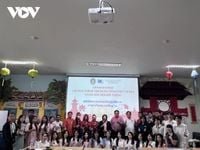On April 21, 2025, the Center for Vietnamese Studies at Rajabhat Udon Thani University in Northeast Thailand conducted the opening ceremony for its basic Vietnamese language training program. This initiative aims to cater to individuals from Udon Thani province, surrounding areas in Northeast Thailand, and even the capital city of Vientiane in Laos. This marks the second time the university has organized such a program, reflecting a growing interest in Vietnamese language and culture.
A total of 36 students from Thailand and Laos participated in this year's training, which is supported by interns from Thai Nguyen University’s Lao Cai branch. The program not only focuses on teaching the Vietnamese language but also emphasizes cultural immersion. Mr. Songpon Baolopet, the Director of the Center, highlighted that the course offers practical experiences that provide insights into the country and its people.
"In addition to knowledge of Vietnamese language and culture, the course also brings practical experiences about the country and people of Vietnam," Baolopet remarked during the opening ceremony. This approach aims to enrich the students' understanding of Vietnam, enhancing their language skills through contextual learning.
The Center for Vietnamese Studies, part of Rajabhat Udon Thani University, serves as a vital institution for the development and dissemination of knowledge regarding Vietnam. It covers various fields, including politics, economics, society, history, and culture. This initiative is crucial for fostering a deeper understanding between Thailand and Vietnam, particularly as relations between the two nations continue to strengthen.
In a related educational initiative, on April 22 and 23, 2025, 60 4th and 5th grade students from ethnic minority backgrounds participated in a contest across three districts: Dong Xuan, Son Hoa, and Song Hinh. This contest not only aimed to enhance their Vietnamese language skills but also provided an opportunity for cultural exploration.
The students embarked on a journey to visit significant historical relics, including the Le Thanh Phuong Temple, the Go Thi Thung Underground, and the An Tho Citadel, which is known as the birthplace of Comrade Tran Phu, the first General Secretary of the Communist Party of Vietnam. Additionally, they explored the natural beauty of Ganh Da Dia.
As part of the contest, the students were tasked with writing a paragraph that expressed their feelings and reflections on the sites they visited. This exercise was designed to not only test their writing skills but also deepen their appreciation for their heritage and history.
Before concluding the event, the students engaged in a cultural exchange with their peers from An Ninh Tay Elementary School in Tuy An district. This interaction provided a platform for sharing experiences and learning from one another, further promoting cultural understanding.
The contest is part of a broader effort to enhance the Vietnamese language skills of children in ethnic minority regions. It aims to foster a love for their homeland, instill gratitude, and cultivate a sense of national pride among the younger generation. These activities are integral to the ongoing project to strengthen Vietnamese language education for preschool children and students in ethnic minority areas.
Both the Vietnamese language training program at Rajabhat Udon Thani University and the student contest in Phu Yen province reflect a significant commitment to cultural education and language development. Such initiatives not only serve to educate but also to bridge cultural gaps between Vietnam and its neighboring countries.
The impact of these educational programs goes beyond mere language acquisition; they are crucial for building relationships and understanding among diverse cultures. As the world becomes increasingly interconnected, fostering such connections through language and cultural appreciation is more important than ever.
As the students from both initiatives continue their journeys of learning, the hope is that they will carry forward the knowledge and experiences gained, contributing positively to their communities and enhancing the cultural ties between Thailand, Laos, and Vietnam.





